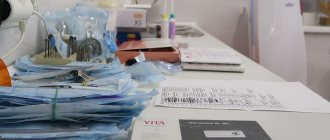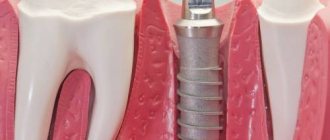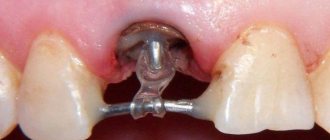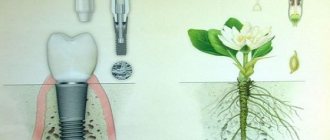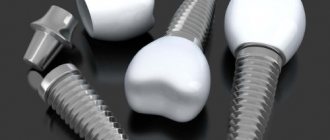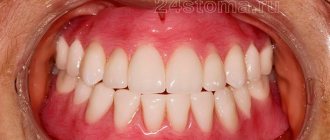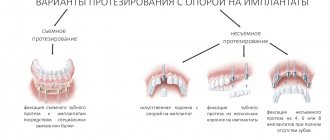Dental implantation is the replacement of a missing tooth with an artificial one by inserting a titanium screw into the jawbone. This is the most physiological and aesthetic way to restore the full functionality of the dentition among all the methods of dental prosthetics available today.
Modern implantation protocols make this procedure absolutely safe, predictable and most effective. However, even a flawlessly performed operation does not mean 100 successes. Although the survival rate of implants reaches 98-99%, in almost 2% of cases the titanium root is rejected.
How long does it take for an implant to take root and when can it fail?
It takes up to 6 months for the implant to take root securely in the bone. The engraftment time depends on various factors, among which the site of installation of the titanium root should be specifically highlighted:
- An implant in the upper jaw takes 5-6 months to take root on average, since the bone in this area is characterized by lower density and weaker blood supply.
- The osseointegration of an artificial root installed in the lower jaw takes 3-4 months.
Rejection of a titanium structure can occur either a couple of days after its installation or after several months or years. It happens that the rejection process is asymptomatic, but more often, such a complication manifests itself very clearly.
Oral care
After installation of implants
You should not brush your teeth for several days after installing titanium roots. The mucous membrane is very sensitive during this period, and there is a high probability of damage to the sutures. You need to rinse your mouth with infusions of medicinal herbs and antiseptic solutions. This will protect the oral cavity from bacteria, relieve swelling and inflammation.
During the rehabilitation period
You can start using a soft toothbrush. Cleaning should be done carefully, avoiding the wound surface. To get rid of food debris, you need to rinse your mouth after eating.
After the implants have taken root
Rules for caring for titanium structures:
- Brush your teeth as usual with a brush and toothpaste. Artificial crowns require no less care than regular teeth. For more thorough cleaning of interdental spaces and crowns, you can use an irrigator.
- Rinse your mouth every time after eating.
- Carry out regular dental checkups. At an early stage, the doctor can detect inflammation of the tissues around the implant and detect gaps in the prostheses.
Signs of dental implant failure:
- Mobility of a titanium rod during immediate implantation.
- Continuous postoperative bleeding (longer than 2-4 days).
- Discharge of pus from the surgical wound 1-2 weeks after the intervention.
- Severe pain at the implantation site, which intensifies with pressure. Painkillers don't help.
- Swelling, edema, inflammation of the gum adjacent to the implant, change in its color (redness, cyanosis), proliferation of granulations, formation of ulcers or fistula.
How to reduce the risk of rejection
Each patient who is going to undergo implantation can reduce the risk of complications if he approaches this issue as seriously as possible.
Depends on the patient:
- choosing a clinic that has qualified specialists to perform this type of operation;
- choosing a competent doctor whom you can trust with your health;
- obtaining reviews from real patients of this doctor.
The specialists of the Implantmaster clinic, who are no less interested in the results of their work than the patient himself, apply the rule of maximum information openness, informing the patient about the quality and manufacturer of the implant, risks, if any, and the possible consequences of non-compliance with medical recommendations. For their part, they do everything in their power to ensure that the patient does not experience implant rejection. However, every patient must understand that taking care of their health cannot be completely transferred to doctors; they can only share responsibility with them.
Author:
Expert opinion
Igor Yurievich Malinovsky
Maxillofacial surgeon, implantologist
Experience: more than 11 years
Dental implant failure is a very rare occurrence. Provided that the implantation is carried out with high quality and the implants are correctly selected, everything ends successfully, and the patient uses new teeth for the rest of his life. If, due to violations of rehabilitation rules, accidental injury or other reasons, the implant is rejected, do not despair. In most cases, it is possible to install a new artificial root of larger diameter in its place after eliminating the pathological process.
Complications during surgery
Due to the fault of the implantologist:
- Infection of the hole due to insufficient sterility of instruments;
- incorrect selection of pin;
- violation of the rules of preoperative preparation;
- installing an implant on insufficiently dense bone, refusing bone grafting and sinus lifting;
- injury or overheating of the bone;
- violation of sterility;
- ignoring contraindications.
Damage to the maxillary sinuses
Injury to the maxillary sinus can occur due to erroneous determination of the height of the alveolar process or too much pressure on the instrument. In this case, the implant is removed and drug treatment is carried out. The next attempt at implantation is carried out no earlier than 6 months later.
Damage to the mandibular nerve
The risk of damage increases when implanted above the mandibular canal, in cases where the bone is not dense enough. In this case, bone grafting (tissue augmentation) is first performed. The injury can cause facial numbness and drooling from the mouth.
Why do dental implants fail?
There are three periods of artificial root rejection:
- From the moment of implantation to dentures.
- Within 2 years after the intervention
- In 2-3 years or more.
If the implants do not take root, the reasons for this complication are as follows:
- Infectious and inflammatory process around the titanium root (peri-implantitis).
- Insufficient volume or poor quality of the jawbone.
- Trauma to the jaw or excessive chewing loads on the recently implanted implant, which led to its displacement and the development of inflammation.
- An allergic reaction to titanium or its alloy (the material from which the artificial root is made).
- Incorrectly selected implant model, errors in its design or design.
- Individual characteristics of the body - exacerbation of a systemic disease, anomalies in the structure of the dental system or bone structures.
- Failure to comply with the recommendations of the implantologist means lack of oral hygiene, bad habits, and dietary errors.
- Errors during surgery - insufficient qualifications of the doctor, the use of implants and consumables of poor quality, non-compliance with the implantation protocol, incorrect installation of the screw structure, etc.
Regardless of what caused the signs of rejection, you should immediately consult a doctor.
Why is peri-implantitis becoming more common? World Research Results
Due to the fact that peri-implantitis is diagnosed several times more often than 5 years ago, world implantologists are literally sounding the alarm - holding symposiums and meetings to discuss this growing problem. And they all agree that the main reason why peri-implantitis occurs is bacteria (how they get into the tissue around the implant is another matter, but this will be discussed later).
On traditional designs, which are designed for a two-stage protocol, a rough surface is provided along the entire length of the implants. This is done for their better fixation in the bone tissue - due to the presence of micropores, bone cells literally grow into the body of the implant. However, after installation of implants during the first five years1, bone resorption occurs up to 1-3 mm (this is considered a physiological norm, and manufacturers are trying to improve the design of implants to reduce this problem). As a result, the rough top of the implants becomes exposed. And if at the same time the lack of oral hygiene on the part of the patient is added to this, then a large amount of plaque accumulates on the implant. This is the main reason for the development of peri-implantitis and subsequent implant rejection.
According to studies conducted by the International Foundation of Implantologists, today it is customary to identify three main reasons for the development of peri-implantitis: the rough surface of implants in combination with poor hygiene and not entirely correct installation (above the gum level), the multicomponent nature of implants (when the connection between the implant body and the abutment is not tight, plaque accumulates ), as well as the wide diameter of the installed structures.
Naturally, we are not talking about all implants. But many manufacturers, unfortunately, do not take into account the high risks of developing peri-implantitis and produce models that significantly increase the likelihood of developing an inflammatory process. This means that their long-term service life is out of the question.
What to do if inflammation begins under the implant?
If inflammation begins around the artificial structure, treatment consists of eliminating the cause that caused it - removing bacterial plaque, improving the quality of oral hygiene, drug therapy, including antibiotics. If the inflammatory process is localized only in the gum area and has not led to the destruction of bone tissue around the implant, there is a 100% chance of eliminating the problem and preserving the structure. With the development of peri-implantitis, severe mobility of the titanium rod or its breakage, the structure is removed and anti-inflammatory treatment is carried out.
The final decision is made by the implantologist after appropriate diagnostic measures. During the period of restorative treatment, the patient is fitted with a temporary denture, which allows maintaining the functionality and aesthetics of the dentition.
The main causes of the development of mucositis and peri-implantitis
So, as noted earlier, the main reason for the development of both mucositis and peri-implantitis is the accumulation of pathogenic microflora. In simple terms, like any inflammation, these problems are caused by ordinary microorganisms: mainly spirochetes and gram-negative anaerobes. These names will mean nothing to the average person; it is much more important to understand where they come from in the oral cavity and why they begin to be active.
In general, our oral cavity contains both “good” and pathogenic microorganisms. But their number is balanced. In the absence of daily oral hygiene, with a decrease in immunity (or if it fights other diseases), the number of “harmful” microbes prevails, which provokes the development of various inflammatory processes. With mucositis it is superficial, with peri-implantitis it is deeper. But if the cause of mucositis is mainly poor oral hygiene, then there are much more prerequisites for the development of peri-implantitis:
- doctor errors: insufficient examination of the patient; installation of implants only on the basis of a panoramic image without computed tomography; penetration of microbes (including saliva) into the cavity during implant installation; errors during prosthetics - for example, overloading of the implant or injury to the mucous membrane,
- violations on the part of the patient: failure to comply with hygiene rules; refusal to treat chronic diseases (in particular, HIV infection, diabetes mellitus); use of prostheses other than for their intended purpose.
Is it possible to re-implant after implant failure?
In general terms, the implantologist’s action plan if a dental implant has not taken root is as follows: removal of the structure, anti-inflammatory therapy, and after 1-2 months, reimplantation with osteoplasty (if necessary).
If the cause of rejection of the artificial root is severe peri-implantitis, then after removal of the screw and complex treatment, classical two-stage implantation may not be available due to severe bone loss. Of course, it is possible to build it up, but first it will take several months for tissue rehabilitation after the elimination of inflammation, and then another 3-6 months for the engraftment of osteoplastic material and the formation of new bone.
An excellent option is immediate loading implantation. Such protocols do not require bone tissue augmentation when 3 or more implants are implanted, but osteoplasty may still be required for single restorations. If dental implants have not taken root, and for medical reasons re-implantation is impossible, there are alternative methods of restoring the dentition - removable and fixed dentures.
Rejection symptoms
It is not always possible to determine the signs that an implant is failing without examining a doctor. Symptoms are often perceived by patients as the natural survival of the product. It is for this reason that in case of severe violations it is recommended to consult a specialist.
If the patient experiences serious problems, then the main signs of dental implant rejection will appear: the smell of pus from the oral cavity, severe bleeding, redness of the gums with accompanying swelling. There may be a general deterioration in health (including fever) and a feeling of severe aching pain that does not go away.
Smell of pus
As a rule, suppuration immediately after implant installation occurs if the patient developed gum inflammation before the procedure (which is a contraindication to the procedure). If the smell of pus appears after several weeks, this indicates a protracted development of complications.
Peri-implantitis is an infectious inflammation of soft tissues. With peri-implantitis, pus may be released, which forms in the area between the titanium root and the gum tissue. The cause is the penetration of infection inside.
If peri-implantitis is not treated on time, the gums gradually acquire a loose structure, and a gum canal is formed with further enlargement. Microbes, saliva and food particles penetrate into it, which aggravates the situation and can lead not only to implant rejection, but also to the complete destruction of dental bone tissue.
Bleeding
Immediately after the procedure, minor bleeding is considered acceptable. However, if after three days the bleeding does not stop, complications should be assumed. Rejection can result from damage to blood vessels, followed by the appearance of a hematoma and suture dehiscence.
If the patient's suture comes apart, there is a risk of pathogenic organisms entering, which will lead to relaxation of the artificial root. Pathological bleeding is accompanied by pain, gum pocket formation, hypothermia and tissue swelling.
How to protect yourself from possible problems in advance?
All the reasons for implant rejection are well known to specialists, which means that the problem can be prevented. It is for this purpose that a thorough examination of the patient is carried out, concomitant diseases and contraindications to surgery are identified.
Here are some useful tips to help minimize potential problems associated with implant failure:
- You need to realize that responsibility for the results of implantation lies not only with the doctor, but also with the patient (failure to follow the specialist’s instructions can ruin the result of even a perfectly performed operation).
- You should choose a clinic specializing in implantology - such centers invest enough money in modern equipment and professional training of employees.
- It is worth contacting those specialists who have sufficient experience and have positive recommendations and reviews from former patients.
- You need to choose high-quality implants from well-known manufacturers.
- It is necessary to scrupulously follow all the implantologist’s instructions after the intervention and carefully monitor oral hygiene.
- You need to monitor your health and keep chronic diseases under control (especially HIV, diabetes and other pathologies that affect the regenerative abilities of tissues).
Of course, some moments are simply impossible to predict. But we must remember that implant rejection is isolated cases, not a pattern.
How to avoid complications
No clinic or specialist can give a 100% guarantee that after the implantation procedure there will be no rejection. However, if we take into account that if all recommendations are followed and the professional approach of the specialist there is practically no risk, then we can talk about a 99% guarantee. The only exception is the natural immunity of the body.
Clinic “A - Medic” offers implantation services by qualified implantologists using high-quality materials. We care about the health of patients and further results after the procedure, therefore we pay special attention not only to the operation, but also to the preparation for it.
What to choose: implants or crowns?
From the point of view of functionality and aesthetics of the dentition, if one or more teeth are lost, the choice between a crown and implants is clearly in favor of the latter:
- An implant not only imitates a natural tooth – it completely replaces it.
- The crown is placed on a pulpless and ground tooth. The tissues of such teeth become less dense and susceptible to rapid destruction, so the loss of a crown is a matter of time. The implant will last for the rest of your life.
- When installing a crown, neighboring healthy teeth are injured; the implant is implanted in place of the missing unit and does not in any way affect the healthy teeth nearby.
Installation of a crown is justified only if there are contraindications to implantation.
Many patients choose traditional dentures based on financial considerations. The cost of installing a Swiss ROOTT implant on a turnkey basis is 32,000 rubles, and the price of a metal-ceramic crown is 25,000 rubles.
Prevention of peri-implantitis development
Thus, the following solutions allow us to solve the problem of the development of peri-implantitis:
- thorough diagnosis of the patient’s condition and planning of the treatment process,
- the choice of solid implants in which the intraosseous part is connected to the abutment, especially in situations where tooth restoration is carried out in the presence of generalized periodontitis,
- the choice of two-piece implants with an antimicrobial coating at the upper base of the implant body, as well as the use of abutments with a smooth antimicrobial coating,
- the use of polished implants that will not accumulate plaque,
- the use of implant models that transfer less load to the alveolar bone, which is susceptible to inflammatory processes,
- strict adherence by the patient to all recommendations of his doctor.
Thus, the main recommendation for patients is to choose a professional doctor who follows modern trends in the field of implantology, improves his skills, works with high-quality brands of implants and uses safe implantation protocols.
More examples 1 According to clinical studies of implant manufacturing companies: Nobel, Straumann, Astra Tech. 2 According to studies published in the journal Perio-implant advisory. 3 Esposito M1, Grusovin MG, Worthington HV Treatment of peri-implantitis: what interventions are effective? A Cochrane systematic review.
Questions and answers
3 years ago I had implants placed on my lower jaw and the remaining teeth were removed.
And in March, all the implants were removed. The result is changes in bone tissue and flat gums. Is it possible to install a flexible prosthesis there? I have a removable denture on top. 3 years ago I had implants placed on my lower jaw with the removal of the remaining teeth. And in March, all the implants were removed. The result is changes in bone tissue and flat gums. Is it possible to install a flexible prosthesis there? On top of my head there is a removable denture
Hello! Prosthetics with soft dentures in such cases is possible, but a preliminary examination of the oral cavity is necessary. Come visit us for a free consultation. Based on the results of the examination, our orthopedists will offer you the best options for dental prosthetics in your case. You can make an appointment by calling + 7 (495) 789-42-02. Sincerely, Patient Support Center SIMPLADENT++8 800 333-53-41
I would like to know how safe it is to carry out implantation and prosthetics at once and whether installing a prosthesis will harm the healing of the implants?
Good afternoon. I have four teeth in a row on my upper jaw on the left side that need to be removed, including two front incisors. The doctor recommends immediate implantation and prosthetics. I would like to know how safe it is and whether installing a prosthesis will harm the healing of the implants. Of course, you don’t want to walk around with a hole in your mouth, but you also don’t want to make things worse.
Hello. Modern implantation systems used in implantation protocols with the possibility of immediate dentures are equipped with special aggressive threads. Implants are screwed into the bone, providing maximum tissue compression. That is, the bone becomes stronger and firmly holds the artificial root in the hole.
The adaptation prosthesis, which is installed on implanted implants, has a metal base that works on the principle of a beam - the implants and prosthesis are a single system, which ensures high primary stability and immobility in the jaw bone. Artificial teeth fixed on a metal beam are made of metal-plastic.
This is a lightweight material that is strong enough to fully participate in the chewing process, but does not overload the implants. Only with this material is it possible to correct the bite at the time of engraftment of the implants. The prosthesis is permanently fixed and should be worn until the osseointegration process is completed - on average this takes about 6-12 months. It is then replaced with a permanent structure made from more durable and aesthetic materials. More detailed information can be obtained at a free consultation with a specialist in one of our clinics.
SIMPLADENT specialists will answer all questions by phone: + 800 333-53-41 Other questions
What should patients do to prevent the situation?
- We recommend that you carefully consider the choice of clinic . The risks are minimal when the operation is performed by an experienced doctor in a well-equipped clinic. Large Centers do not skimp on equipment and staff training. When choosing a dentist, you can rely on reviews from patients who have already undergone treatment there.
- Go through a full examination , tell the doctor about all your health problems, without hiding anything.
- When choosing implants you should not save money ; in this situation, the price is proportional to the quality. Popular brands have more guarantees and fewer risks.
- Follow the doctor's recommendations in the postoperative period, including giving up bad habits.
Recommendations to help avoid implant failure:
- Eliminate solid foods from your diet to avoid overloading the implant.
- Stop smoking - smokers have a significantly higher risk of rejection
- Take prescribed medications
- Avoid overheating and hypothermia
- Maintain oral hygiene - brush your teeth 2-3 times a day, rinse your mouth with antiseptic solutions, use floss or irrigator to remove food debris from the interdental spaces
- Visit the clinic as scheduled.
